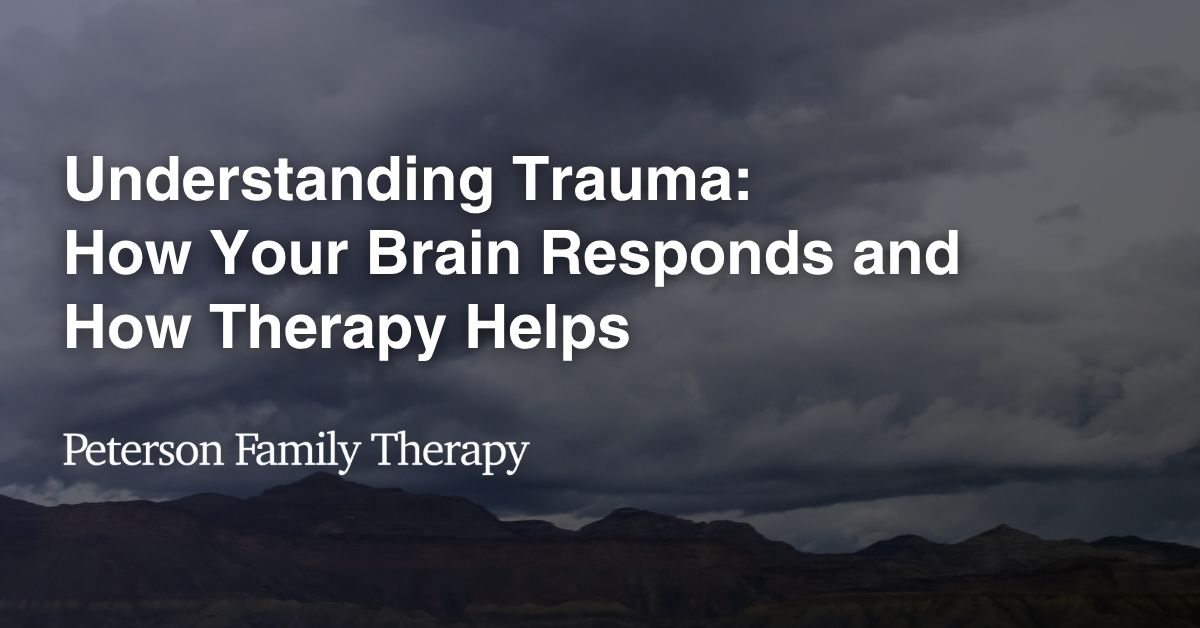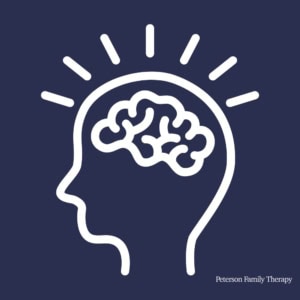Understanding Trauma: How Your Brain Responds and How Therapy Helps
Trauma affects millions of people, yet many don’t fully understand how it impacts the brain and why certain symptoms persist long after a traumatic event. As a licensed clinical social worker with over 20 years of experience, including specialized work with veterans at the VA, I want to help you understand trauma in simple terms and explain how therapy can help you heal.

The Caveman Brain: Why We’re Wired for Survival
To understand trauma, imagine you’re a caveman or cavewoman sitting peacefully, watching a beautiful sunset. You don’t notice the tiger crouched behind you, ready to attack. Here’s the thing: we didn’t inherit that relaxed cave person’s DNA.
We inherited the DNA from the hypervigilant caveman up in the tree, clutching their infant, constantly scanning the jungle for danger. That hypervigilant brain is what we carry today—it’s called the amygdala.
This survival mechanism served our ancestors well, but in modern life, it can work against us when trauma occurs.
What Happens in Your Brain During Trauma
 When we’re in survival mode, the amygdala gets activated, making it extremely difficult to think clearly. Our frontal lobe—the rational, thinking part of our brain—essentially shuts down. Instead, our fight, flight, freeze, or fawn responses take over.
When we’re in survival mode, the amygdala gets activated, making it extremely difficult to think clearly. Our frontal lobe—the rational, thinking part of our brain—essentially shuts down. Instead, our fight, flight, freeze, or fawn responses take over.
Think about it this way: if you’re in the jungle and see a tiger that hasn’t noticed you yet, what do you do? You freeze, because any movement might catch its attention. But if the tiger sees you, you run. And if it catches you, you either fight back or fawn (play dead, submit, or become completely still).
Take a moment to reflect: In dramatic or traumatic experiences you’ve had, how did these responses show up for you?
Trauma as Scattered Glass
I like to think of trauma as broken glass, scattered everywhere. Your brain desperately tries to make sense of what happened through flashbacks, nightmares, and triggers. It’s attempting to figure out:
- Why the trauma occurred
- How to prevent it from happening again
- What you could have done differently
This process brings up thoughts like:
- “I should have done this differently”
- “I could have prevented it”
- “It’s my fault”
These mental patterns often lead to hypervigilance—a pervasive sense that the world is dangerous and can’t be trusted. This mindset can infiltrate every aspect of your life.
The Problem with Trauma Memory
Here’s what makes trauma particularly challenging: it’s difficult for our brain to remember traumatic events in a clear, linear way. Instead of a coherent narrative, trauma memories often present as:
- Fragmented images
- Intense emotions without context
- Physical sensations
- Distorted perspectives that suggest we did something wrong
This fragmented nature often creates “stuck points”—those persistent thoughts of “what if,” “should have,” and “if only” that keep replaying in your mind. These aren’t just negative thinking patterns; they’re your brain’s attempt to solve an unsolvable puzzle.
How Shame and Guilt Feed the Cycle
Along with these stuck points often comes shame and guilt, which actually feed the trauma cycle. When we believe we’re somehow responsible for what happened to us, it creates additional emotional wounds that need healing.
How Trauma Therapy Helps
 The goal of trauma therapy in Salt Lake City is to help put those scattered pieces of memory back together into a coherent narrative. Through specialized therapeutic approaches, we help your brain understand: “Oh, that’s what happened. I don’t need to keep generating nightmares, flashbacks, or stuck points anymore.”
The goal of trauma therapy in Salt Lake City is to help put those scattered pieces of memory back together into a coherent narrative. Through specialized therapeutic approaches, we help your brain understand: “Oh, that’s what happened. I don’t need to keep generating nightmares, flashbacks, or stuck points anymore.”
Effective trauma therapy helps you:
- Process traumatic memories in a safe environment
- Challenge distorted thoughts and stuck points
- Develop healthy coping mechanisms
- Reduce hypervigilance and anxiety
- Reclaim your sense of safety and peace
Your Path to Healing
At Peterson Family Therapy, we use evidence-based approaches including Cognitive Processing Therapy (CPT), Acceptance and Commitment Therapy (ACT), and other trauma-informed modalities. The key is getting clarity about what happened, healing the emotional wounds, and learning to live at peace once again.
Remember: Your brain’s response to trauma is normal and adaptive—it’s trying to protect you. But you don’t have to stay stuck in survival mode forever.
If you’re struggling with trauma symptoms, you don’t have to face this alone. Candace Peterson, LCSW, specializes in trauma therapy and has extensive experience helping individuals heal from traumatic experiences. Contact Peterson Family Therapy today to learn how we can support your healing journey.
Contact Information:
Candace Peterson
Clinical Social Work/Therapist, LCSW
Peterson Family Therapy
4505 Wasatch Blvd #260
Salt Lake City, UT 84124
Peterson Family Therapy provides trauma counseling, couples therapy, and individual therapy in Salt Lake City, Utah. We specialize in Emotionally Focused Therapy (EFT) and evidence-based trauma treatment approaches.



Leave a Reply
Want to join the discussion?Feel free to contribute!